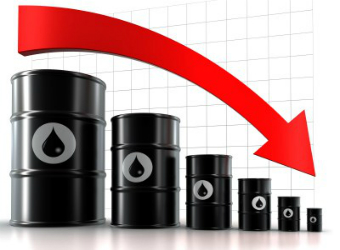U.S. West Texas Intermediate (WTI) crude futures dropped Thursday morning at the start of an OPEC meeting in Vienna.
Prices had been close to $52.0 a barrel but sank to around $50.8 a barrel shortly after oil ministers began talking at a press conference at 9.30 a.m. London time.
“Nine months with the same level of production that our member countries have been producing at is a very safe and almost certain option to do the trick,” Khalid Al-Falih, Saudi Arabia’s energy and industry oil minister, told CNBC in Vienna.
Saudi Arabia’s delegate explained while all options had been considered ahead of the announcement – including deeper cuts and a possible six-month extension – he suggested reaching an agreement to curtail oil production by a further nine months appeared the “safe bet”.
Oil’s fall is believed to be due to traders feeling disappointed at the lack any deeper cuts to its production. Miswin Mahesh, an oil analyst at Energy Aspects, told CNBC via telephone that “oil prices are always choppy at this point” when OPEC meetings are happening.
He added that the price fall on Thursday morning “was probably triggered” by “imbalances” in the market with some expecting deeper cuts to OPEC production. A nine-month extension was already baked into the price, according to Mahesh.
At around 10.00 a.m. London time, Brent had recovered to trade 0.1 percent higher at $54.11 a barrel with the U.S. West Texas Intermediate (WTI) benchmark edging up by nearly the same amount to sit at $51.37 a barrel.
This is a breaking news story, please check back later for more
Prices have risen on a consensus that a pledge by the Organization of the Petroleum Exporting Countries (OPEC) and other producers, including Russia, to cut supplies by 1.8 million barrels per day (bpd) would be extended into 2018, instead of covering only the first half of 2017.
Speculation was rife that the cuts may be extended by nine and possibly 12 months, said Jeffrey Halley, analyst at futures brokerage OANDA in Singapore.
The production cut, introduced in January, was initially only to cover the first half of 2017, but an ongoing glut has put pressure on OPEC and its allies to extend at a meeting in Vienna on Thursday.
“It is widely expected the cartel (OPEC) will, at a minimum, extend its production quota for another nine months,” said Stephen Schork of the Schork Report.
James Woods, analyst at Australia’s Rivkin Securities, said that an extended production cut was already “factored into the price of oil”, adding that is was unlikely that a deeper cut would be announced at this stage.
“OPEC officials prefer … to wait and see the impact of an extension in helping rebalance the market prior to taking any more drastic actions,” he said.
Energy consultancy Wood Mackenzie said a nine-month extension “would have little impact on our price forecast for 2017, which is for an annual average of $55 per barrel for Brent”.
It estimated that a nine-month extension would result in a 950,000 bpd production increase in the United States, undermining OPEC’s efforts.
U.S. oil production has already risen by more than 10 percent since mid-2016 to over 9.3 million bpd as its drillers take advantage of higher prices and the supply gap left by OPEC and its allies.
Should the meeting in Vienna result in a cut extension to cover all of 2018, Wood Mackenzie said the tighter market could push average 2018 Brent prices up to $63 per barrel.
Brent has averaged $53.90 per barrel so far this year.
If the meeting fails to agree an extended cut, traders expect oil prices to fall as this would result in ongoing oversupply.
Source: CNBC
